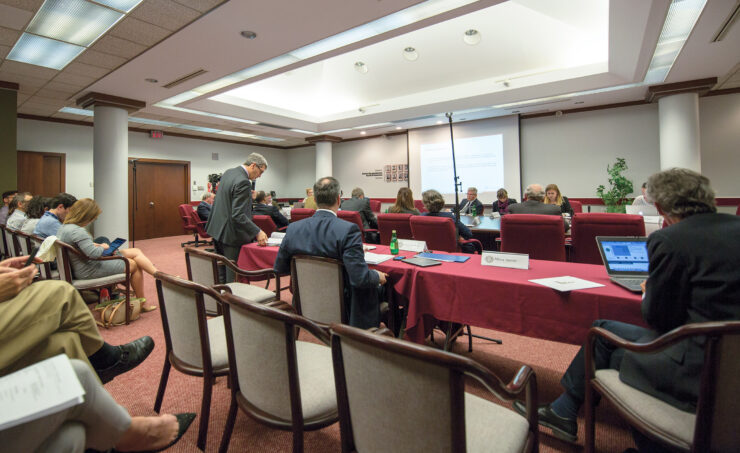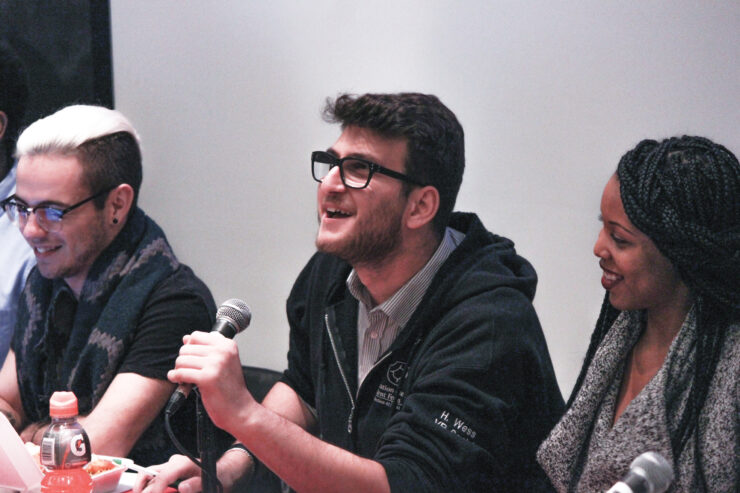It’s an inherent conflict of interest — the Election Committee also failed to raise any awareness for the BOG and Senate races
On March 21, the Fulcrum hosted a debate between the five candidates for the University of Ottawa’s Board of Governors (BOG) undergraduate student seat.
The debate was live-streamed on the Fulcrum’s Facebook page and watched by over 1,200 people. It was the source of numerous reactions from the virtual audience who got to ask questions and share their opinions on the race and the candidates.
The debate touched on a number of important issues for students such as mental health, racism on campus, sexual violence on campus, and divesting from fossil fuels. But one issue that was not addressed during the debate was the lack of coverage, promotion and overall structure of the BOG election.
For one, this race was organized by the University of Ottawa Students’ Union (UOSU), which was also holding elections for representatives on the Executive Committee and Board of Directors. These races — especially for the Executive Committee — were covered much more.
For instance, the UOSU, hours before the Fulcrum debate, held a question and answer (Q&A) with the candidates for the Executive Committee, this event was held in both languages. The Fulcrum was the only platform to give candidates for the BOG the opportunity to share their plans and ideas with the student population.
This should not have been the case as this did not give Francophone students the same opportunity as their Anglophone counterparts to get familiar with the candidates. There should have been another debate or at the very least a Q&A in French with the BOG candidates.
This was the responsibility of the UOSU’s Elections Committee who failed the BOG candidates, and the student body, by not hosting a bilingual Q&A or debate. Regardless of if the Fulcrum hosts a debate, promoting the race and the candidates is the Elections Committee’s responsibility. By not organizing a bilingual debate for BOG candidates, they failed the U of O’s francophone students.
But this speaks to a bigger issue: the BOG race should not be organized by the UOSU as it is an inherent conflict of interest — student Governors and Senators are not UOSU representatives — they are independent representatives of the student body.
The University of Ottawa should not be tasking UOSU with organizing races for its administrative bodies. Not only was it an inherent conflict of interest, but the UOSU’s Executive Committee and BOD elections completely overshadowed the BOG and Senate elections — and with reason — an organization will first and foremost promote elections for its own elected bodies.
The BOG race is just as important as any executive race — if not more. The undergraduate student representative on the BOG gets to vote on the university’s policies, finances, procedures, and represents the student body as a whole. They can directly help enact concrete change at the university. The same could be said for the Senate and BOD races.
Furthermore, to the average student, the terms Board of Directors and Board of Governors are interchangeable — most don’t know the difference. Elections for the two UOSU bodies should not be held at the same time as the elections for the two University of Ottawa administrative bodies.
In 2020, the BOG election took place in June, which was problematic since most students were off for the summer and not actively paying attention to events taking place at the U of O. This led to an extremely low turnout — only 6,2 per cent of eligible students voted.
The turnout was once again extremely low in 2021 with only 8.4 per cent of eligible students voting in the BOG race, but it is clear there was a lack of awareness surrounding this race. However, awareness is not the only factor that led to such a low turnout. In truth, holding the race at a time that is favourable for students would certainly help improve the turnout.
Perhaps September could be an option worth observing. In September, students are just coming back to campus and they are open to discovering new things. They are also not stressing over midterms and quickly approaching exams. It is a new semester filled with hopes and excitement — there is an overall sense of renaissance.
Having the races separated would also help students get a better understanding of what body they are voting for and what exactly this elected body does. As things stand, it is a confusing process and elections need to be re-examined so that everyone can get a clear picture of what exactly is happening.
We can’t continue having only six to nine per cent of students vote in BOG elections. How are elected student representatives supposed to hold accountable their fellow Governors and Senators if they have the backing of less than 10 per cent of the student body?
This needs to change, students need to vote, but the people organizing the elections also need to make it as easy as possible for students to do so. They need to help students understand what they are voting for and shine a light on the candidates — this was clearly not done this year’s election period.
Editorials are written by the Fulcrum’s 13-person editorial board and express the shared views and opinions of the Fulcrum’s editorial staff. To share your own views, email editor@thefulcrum.ca.





